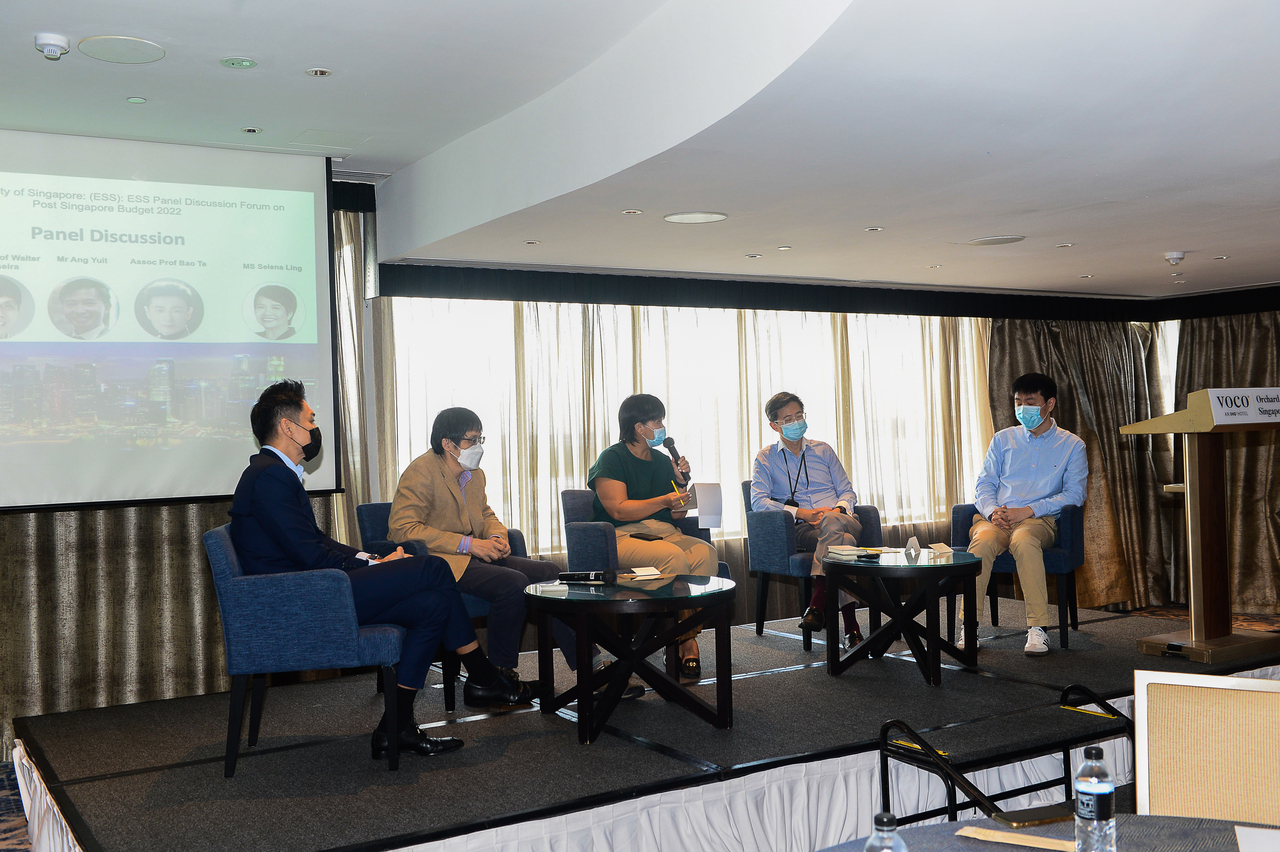Budget 2022 makes taxes more progressive, shows Govt's intentions to address inequality: Panel
Sign up now: Get ST's newsletters delivered to your inbox

(From left) Mr James Cheo, managing director and chief investment officer for South-east Asia, global private banking and wealth, at HSBC, SUSS Associate Professor Walter Theseira, OCBC Bank head of treasury research and strategy Selena Ling, Association of Small and Medium Enterprises vice-president Ang Yuit and NTU Associate Professor Bao Te.
PHOTO: PHILLIP LAM YIT THONG
SINGAPORE - Budget 2022 presented a slew of changes to make Singapore's tax system more progressive and demonstrated the Government's intentions to address inequality, a panel of experts said on Saturday (Feb 19).
However, they also pointed out that more could be done to support small and medium-sized enterprises (SMEs) and lower-income residents, and to tax the wealthiest in Singapore's society.
The panellists were speaking at a post-Budget discussion organised by the Economic Society of Singapore (ESS) at Voco Orchard Singapore, and highlighted several key announcements made during Finance Minister Lawrence Wong's Budget speech on Friday, such as the higher carbon tax rates to come and changes to manpower policies.
One panellist, Mr James Cheo, HSBC's managing director and chief investment officer for South-east Asia, global private banking and wealth, pointed out the impact of the Covid-19 pandemic on the divide in wealth, and how wealth has been accumulated in the likes of property and financial assets.
While the new property tax increases mean that the top 7 per cent of owner-occupied residential properties will be affected, wealth taxes can be more targeted, he said.
"It can be crafted to be more specific to target, say for example, the (wealthiest) 0.1 per cent of people in Singapore," he suggested.
Mr Cheo acknowledged that at the end of the day, it is about how much Singapore values inclusion and how much it wants the strongest in the society to help its weakest, which is a big debate.
"But I think the direction is set to be a more inclusive society, and... in many ways, this Budget is well-balanced. It has those elements of inclusion."
Another speaker, Association of Small and Medium Enterprises vice-president Ang Yuit, highlighted how Budget 2022 put forward a continuation of various measures which have earlier been signalled or implemented for SMEs.
He outlined the continued challenges which businesses face, including rising energy and labour costs, and suggested that more could have been done in Budget 2022 to cushion the impact on firms.
Changes to government procurement contracts could also be introduced to shift the emphasis away from securing the lowest pricing, which advantages larger corporations, to help SMEs grow, Mr Ang added.
During a discussion on the Progressive Wage Model (PWM), which sets out minimum pay and training requirements for workers at different skill levels, he spoke about the pain faced by SMEs in industries where the PWM has been rolled out.
Their revenues are not increasing, but their costs are higher because of increased wages for workers, which means that they are squeezed in the middle, he explained.
On this point, OCBC Bank head of treasury research and strategy Selena Ling, who is also ESS vice-president and moderator of the discussion, noted that there is an implicit assumption under the PWM that if an employer pays a worker higher wages, he will get higher productivity from the worker.
But how employers can ensure that productivity gains come through is an issue which perhaps needs to be addressed, she said.
Associate Professor Walter Theseira from the Singapore University of Social Sciences pointed out that there were no new policies to address the issue of living standards for lower-income Singaporeans.
He acknowledged that there were measures to bolster social support, such as the extension of child development programmes, but there were no new policies for issues such as food insecurity.
Prof Theseira also noted that unemployment insurance was not mentioned during Budget 2022, despite it being much talked about last year.
"(This) indicates either that the Government is not ready yet to come up with a good proposal or it may not require government spending. Maybe it will be financed entirely, for example, through CPF (Central Provident Fund) or other measures."


